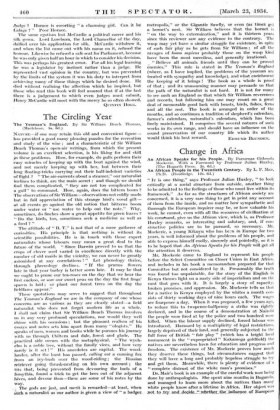Change in Africa
An African Speaks for his People. By Parmenas Githendu Mockerie. With a Foreword by Professor Julian Huxley. (The Hogarth Press. 3s. 6d.) " IT is one thing," says Professor Julian Huxley, " to look critically at a social structure from outside, another thing to be admitted to the feelings of those who must live within its framework." As far as the structures of African society are concerned, it is a very rare thing to get in print any account of them from the inside, and no matter how sympathetic and thorough the European inquirer may be, or how valuable his work, he cannot, even with all the resources of civilization at his conut►and, give us the African view, which is, as Professor Huxley remarks, so interesting and salutary, and, if con- structive policies are to be pursued, so necessary. Mr. Mockerie, a young Kikuyu who has bc2n in Europe for two years, is well informed about the problems of his people, and able to express himself coolly, sincerely and pointedly, so it 1, to be hoped that An African Speaks for his People will get all the attention it deserves.
Mr. Mockerie came to England to represent his people
before the Select Committee on Closer Union in East Africa, and includes in his book a memorandum prepared for that Committee but not considered by it. Presumably the truth was found too unpalatable, for the story of the English in Kenya throws light on a nasty side of imperialism and on the cant that goes with it. It is largely a story of rapacity, broken promises, and oppression. Mr. Mockerie tells us that for a native in Kenya employed by the whites a month con- sists of thirty working days. of nine hours each. The wages are fourpenee a day. When it was proposed, a few years ago, to reduce this to twopence-halfpenny a strike was rightly
declared, and in the course of a demonstration at Nairobi the people were fired at by the police and two hundred were killed. When the labour supply declined, forced labour was introduced. Harassed by a multiplicity of legal restrictions.
largely deprived of their land, and generally subjected to the full force of British " fair play " (which has a bright local monument in the " expropriated " Kakamega goldfield) the natives are nevertheless keen for education and progress and freedom. The existence of Mr. Mockerie proves how much they deserve these things, but circumstances suggest that they will have a long and probably hopeless struggle to try and get them. Meanwhile, there is plenty of evidence of a " complete distrust of the white man's promises."
Dr. Mair's book is an example of the careful work now being done by anthropologists. She spent nine months in Buganda, and managed to learn more about the natives than many white people know after a lifetime in Africa. Her object was ACot ..Wr- and Slekkle...”_Wilether-theiinfluence of European civilization on primitive peoples is, in the long run, beneficial or the reverse," but to " indicate-the-main pro-bre-Ms-of adjusr- ment which it creates " both for the natives and the whites. To do this it was first necessary to attempt a " reconstruction of the Buganda system as Europeans first found it." This was done some twenty-five years ago by the Rev. John Roscoe, but the anthropologist of today does not take quite the same line of approach, and is liable to find unsatisfactory in Roscoe's work the fact that he " does not envisage Baganda society as a mechanism of co-operation." It is definitely as a " student of economic contact " that Dr. Mair has made her studies of birth and childhood, marriage, land tenure, religion and magic. She does not agree with General Smuts in advo- cating the subordination of African life to the needs of "European production, a system " which deliberately forces a section of an African community to lead two separate lives " and to follow economic ,pursuits in isolation from the social environment :
•
" The European wishes to acquire all the best land and cultivate
crops for export by means of native labour ; the native wishes to remain in his village and cultivate his own food crops."
The problem is how to reconcile two such different aims.
Dr. Mair would agree with Mr. Moekerie in deprecating the growth and indeed encouragement of economic individualism , at the expense of corporate loyalty and communal progress. Sfie suggests that an effective social force could be brought into being by the establishment of village eo-operative societies. Again and again it appears that 4ven where the efforts of the whites are well meant they are weakened in their effect by want of imagination, and this is true even of the mis- sionaries, who " are doing more than any other single force towards the adaptation of the Muganda to his new life." Dr. Mair believes that " the demands made by Africans, how- ever intelligent, however highly educated, cannot be taken as decisive in determining the lines along which African de- velopment should go," and that " the decision should be made on the results of a scientific study of the actual problems involved." But ideally the scientific white and the African would be working together, two heads- being proverbially































































 Previous page
Previous page